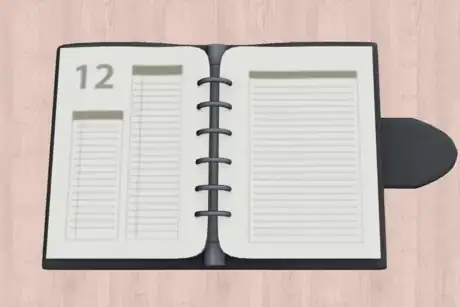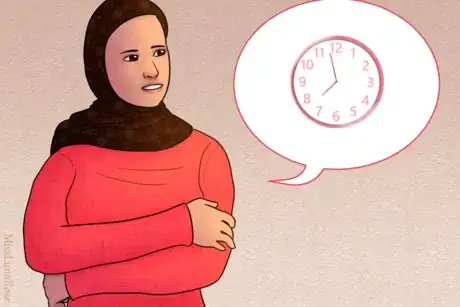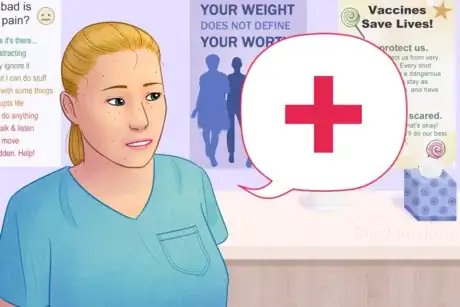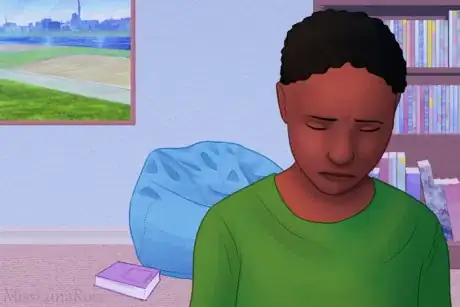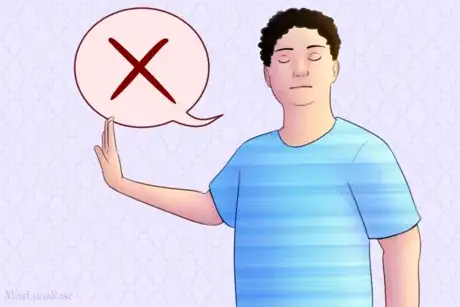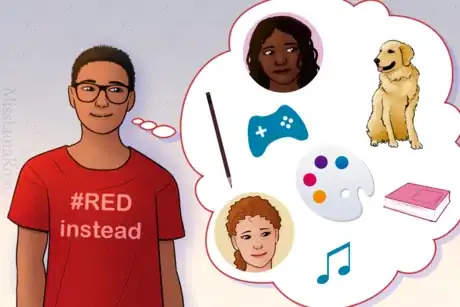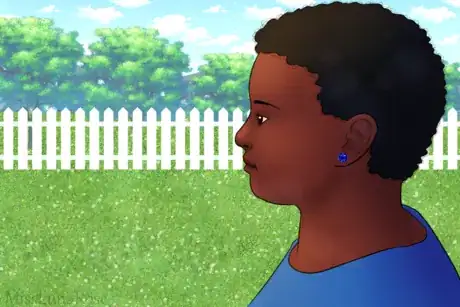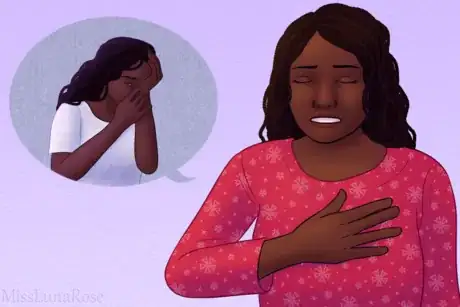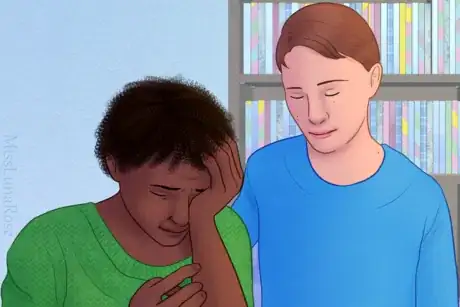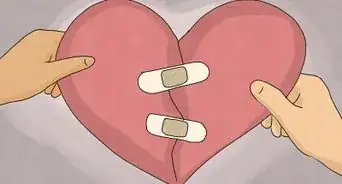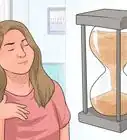This article was co-authored by Chloe Carmichael, PhD. Chloe Carmichael, PhD is a Licensed Clinical Psychologist who runs a private practice in New York City. With over a decade of psychological consulting experience, Dr. Chloe specializes in relationship issues, stress management, self esteem, and career coaching. She has also instructed undergraduate courses at Long Island University and has served as adjunct faculty at the City University of New York. Dr. Chloe completed her PhD in Clinical Psychology at Long Island University in Brooklyn, New York and her clinical training at Lenox Hill Hospital and Kings County Hospital. She is accredited by the American Psychological Association and is the author of “Nervous Energy: Harness the Power of Your Anxiety” and “Dr. Chloe's 10 Commandments of Dating.”
There are 7 references cited in this article, which can be found at the bottom of the page.
wikiHow marks an article as reader-approved once it receives enough positive feedback. This article has 25 testimonials from our readers, earning it our reader-approved status.
This article has been viewed 834,623 times.
Break-ups can be devastating. It's a rough transition from sharing every part of your life with someone, to picking up the phone and suddenly remembering that it's a bad idea to call. In some cases, people can slip into depression: a mood disorder that can feel so heavy and difficult that no one else can possibly understand what you are going through. Caring for yourself, and deciding how to move forward, can be a serious challenge.
Steps
Handling Depression
-
1Know the difference between sadness and depression. After a breakup, it's normal to cry, lose sleep, get angry, and temporarily lose interest in regular activities. This is part of the healing process. But you might have a more serious problem if you're experiencing things like:[1] [2]
- Serious changes in eating or sleeping habits
- Fatigue
- Often feeling worthless, empty, or hopeless
- Unbearable, relentless emotional pain
- Irritability
- Difficulty focusing or making decisions
- Failure to clean your living space and manage basic hygiene
- Thinking about death, or hurting yourself
-
2Log your symptoms. If you suspect that you may have depression, or that something else might be wrong, then try keeping a journal to note what you're going through. Write it on paper, or on your computer. It can be helpful to review later, and you can bring it to the doctor if you decide to get an evaluation.
- Try writing down basic feelings, like "I felt hopeless all morning" or "I tried to have fun but was mostly listless and tired." You don't have to be very detailed if it's too upsetting.
- Try writing down what you did, like "I watched movies all evening and cried a lot" or "I stayed in bed for 3 hours in the morning because I had no energy."
Advertisement -
3Know the time frame and urgency level that typically constitutes a problem. Experts usually recommend waiting around 2 weeks to a month to see if things get better. You also have a problem if your sadness is preventing you from doing basic living tasks (like working or caring for your kids).[3] You should see a doctor if:
- You haven't improved at all within 2-3 weeks
- You can't work or take care of yourself or your family
- You think that you might hurt yourself
-
4Talk to a doctor about treatment options. Your doctor may recommend therapy and/or medication to correct chemical imbalances in the brain.
- The brain can get sick just like other body parts can. There's nothing "wrong" with you if you have depression, or if you take medication to help fix it.
-
5Contact a crisis line if you're in immediate danger. If you think that you might be about to harm yourself, don't just sit there. Grab your phone, and find a line to text or call.[4]
- Call the National Suicide and Crisis Lifeline at 988 to talk to get help.
- If you'd be more comfortable messaging someone, connect with a trained crisis counselor by texting the Crisis Text line at 741741 in the US. If you're in Canada, the number is 686868, and in the UK the number is 85258.
Handling Your Feelings
-
1Recognize that processing your feelings will take time. Especially if the relationship was long-term, this will be a difficult and probably a long process. Expect that, and give yourself as much time as you need to get over the breakup.
- Some people believe that the recovery from a breakup takes about half the time that the relationship lasted. For example, if your relationship lasted 6 months, then you may need 3 months to fully recover. Keep in mind that everyone is different, so you may take a little longer or shorter than this.
-
2Give yourself space and time to feel your difficult feelings. It's normal for people to feel anger, frustration, sadness, fear, and all kinds of emotions after a bad breakup. Some of them may not be related to your ex at all.[5] That's okay. Let yourself cry and be upset. It's okay to mourn the lost relationship.
- Try labeling your feelings if they're overwhelming. Are you feeling insecure? Worried about the future? Lost?
-
3Put away any reminders of your old relationship. Take everything that reminds you of your ex (pictures, letters, keepsakes) and put it all in a box. Then put the box out of sight, like in a closet corner or under your bed. Leave it there. You can sort it all out later, after you've gotten over the breakup.
- Don't throw it all away. You may regret that later.
- If you think you might be tempted to revisit the box too soon, try putting a notice on it, like "do not open until April."
-
4Find a good outlet. Coping with strong emotions can be hard. It helps to find a good way to let them out. Experiment with different ways to express yourself, as long as they're healthy and safe. Here are some ideas:
- Exercise[6]
- Express yourself using the arts: painting, making music, drawing, writing, etc.
- Cry
- Imagine yourself dramatically telling your story on a talk show
- Write in a journal
- Rip or cut up paper from the recycling bin
- Scream into a pillow and hit the bed
- Smash ice cubes in the bath tub
-
5Engage in your hobbies, and try exploring new ones too.[7] It helps to find new ways to be productive and creative.
- Has there ever been anything you wanted to try when you were younger, but you couldn't? Try doing it now!
-
6Ask yourself what you need right now. If you notice yourself having a rough time, stop. Ask yourself "What would help me feel better?" Think about what you could do right now that would make this difficult situation a little easier. Perhaps things could be improved a bit by something like...
- Calling a friend[8]
- Taking a warm shower
- Playing with your pet
- Drinking hot chocolate
- Getting a hug
- Doing something else that feels right at the moment
-
7Work towards moving on. Eventually, you'll need to accept that the relationship ended, and be able to plan for a future that doesn't include your ex. This is your goal. Keep it in the back of your mind. You don't have to be there yet, and it may take a while. It's helpful to remember which way you want to be heading.
-
8Remember that recovery isn't linear. Setbacks happen, but that doesn't make them permanent. You may get better a while, and then suddenly feel a little worse. That doesn't mean that you won't recover. You may bounce back from the setback in a day or week or two.
Caring for Yourself
-
1Try to keep a regular schedule as best as you can. It's going to be hard at first, but you may have to force yourself to eat regular meals and sleep regularly. This too will take time, so be patient with yourself.
- You may need to function at a sub-optimal level for some time. This is okay.[9]
-
2Find sneaky ways to be a little healthier. When you have depression, it can be hard to put effort into your health. Something is better than nothing. Find little ways you can look after yourself, and then be proud of yourself.
- If food prep is hard, try eating a healthy no-prep snack, like an apple or string cheese. You can even keep a non-perishable snack (like a jar of nuts) at your desk.
- Do mini exercises, like leg lifts while watching TV, or lifting a five-pound weight while lying in bed.
-
3Work on basic hygiene. Depression can make ordinary tasks (like brushing your teeth or showering) monumentally difficult. They are, however, very important for your health. Neglecting them for too long can make you sick, or cause health problems later on.
- Try to brush your teeth at least once a day. Even a cursory brush, without toothpaste, is better than nothing. You can also scrape your teeth with a washcloth to help remove buildup.
- Try to shower at least every other day. Use baby wipes to wipe areas that tend to get sweaty, like your armpits and the zone under your bra. Apply deodorant.
- If you're too tired to get dressed, at least change your pajamas and your underwear every day. You can also put on an old t-shirt and sweatpants if you're feeling well enough.
-
4Stay away from unhealthy coping mechanisms. Sometimes, when people are suffering, they are tempted to abuse alcohol, use drugs, or binge eat. This can harm your body, and make you feel even worse.[10] Look for other options.
-
5Don't be afraid to ask people to help you with self care and other basic tasks.[11] Depression can make it hard to initiate tasks, and stay focused on them. Sometimes, having another person there with you can help a lot. You can ask for help with some hygiene and cleaning tasks that you're struggling to manage. Here are some examples of things you could say:
- "I'm exhausted, and having a hard time cleaning my house. Would you please come over and help me? I've got root beer and vanilla ice cream, so I could pay you with a root beer float afterwards."
- "I know that I've been a mess lately, and that I've been forgetting to shower. I'm sure you don't want a smelly roommate. Would you give me a push if I'm turning stinky?"
- "This breakup really has me devastated, and I'm struggling to stay on top of chores. Would you be willing to be my laundry buddy, and do laundry with me?"
- "Dad, I've been too tired to cook for myself lately. Is there any chance I could come over for a healthy dinner sometime?"
Avoiding Isolation
-
1Reach out to your loved ones. Spend lots of time with your friends and family during this time.[12] They will be your support system as you deal with the aftermath of the break-up. Did you see some of these people much during the relationship? If the relationship was intense and long-term, chances are you have not seen some of your friends or maybe even family for months. Take time to spend quality time with them and do something fun.
- Tell your loved ones what you're going through. It's okay to say "I had a rough breakup and I could really use a friend right now."
-
2Make socializing part of your daily schedule, if possible. It's easy to fall into the trap of self-isolation during a depressive episode.[13] It's crucial that you keep reaching out to people, so that you don't start spending days or weeks on your own.
- Try to spend at least half an hour every day on quality time with your loved ones.
-
3Say your feelings out loud. Being honest about your feelings helps people know how to respond to you. Don't rely on subtext or hints to let people know how you feel. Say what emotion you're feeling, and go from there.
- "I'm feeling tired today."
- "Right now, I just want to do something easy, like watching a movie together."
- "I'm exhausted. Could we talk in the morning?"
- "I'm feeling better today. I think it would be fun to go out. Are you in the mood for that?"
- "I feel kinda shaky and nervous."
- "I don't have the energy to go out. Does staying in and hanging out sound OK to you?"
-
4Tell people how they can help you, especially if they are confused. Most people want to help you, but they may not necessarily know how. They may misjudge what it is that you need. The best thing you can do is tell them how to help you. Here are some examples:
- "I could really use a distraction today. Wanna go do something fun?"
- "I just need someone to listen and be there for me right now."
- "I'm not ready to meet cute guys yet. I'm still not over him, and I need time to process. I'll let you know when I want you to point out hotties for me."
- "I need a hug."
- "I'm tempted to text her. Can you hang out with me, and help me not do that?"
- "I'm feeling lonely, and I could use some company. Anything from taking a walk and talking to watching TV together would be really nice."
-
5Find some trusted people to confide in. Facing difficult emotions is hard, and it's even harder when you do it alone. Look for a good listener, and ask them if it's a good time to talk about things. Letting it all out can help a lot.
Warnings
- Don't sleep with someone / hook up with someone just because you are lonely or feel alone. Invite a friend over or do something you love and that makes you happy instead. The consequences are not worth that momentary feeling of pleasure, and you will only feel more lonely in the end. So do something positive instead.⧼thumbs_response⧽
- Avoid making major life decisions during the beginning of this period.[14]⧼thumbs_response⧽
References
- ↑ https://www.healthline.com/health/depression/after-break-up#symptoms
- ↑ https://www.glamour.com/story/ask-an-expert-is-my-sadness-af
- ↑ https://consumer.healthday.com/encyclopedia/depression-12/depression-news-176/depression-after-a-breakup-646224.html
- ↑ https://consumer.healthday.com/encyclopedia/depression-12/depression-news-176/depression-after-a-breakup-646224.html
- ↑ https://www.elitedaily.com/dating/post-breakup-depression-missing-ex/1710401
- ↑ Chloe Carmichael, PhD. Licensed Clinical Psychologist. Expert Interview. 29 May 2019.
- ↑ Chloe Carmichael, PhD. Licensed Clinical Psychologist. Expert Interview. 29 May 2019.
- ↑ Chloe Carmichael, PhD. Licensed Clinical Psychologist. Expert Interview. 29 May 2019.
- ↑ https://www.helpguide.org/articles/grief/dealing-with-a-breakup-or-divorce.htm
- ↑ https://www.helpguide.org/articles/grief/dealing-with-a-breakup-or-divorce.htm
- ↑ Chloe Carmichael, PhD. Licensed Clinical Psychologist. Expert Interview. 29 May 2019.
- ↑ Chloe Carmichael, PhD. Licensed Clinical Psychologist. Expert Interview. 29 May 2019.
- ↑ https://www.refinery29.com/en-us/am-i-depressed-after-breakup
- ↑ https://www.helpguide.org/articles/grief/dealing-with-a-breakup-or-divorce.htm
About This Article
Coping with depression after a breakup can be difficult, but you can get through it by giving yourself time to process your emotions and reaching out to your family and friends. Remember that it’s normal to feel anger, sadness, and fear after a breakup, so let yourself cry and be upset. As you work through these difficult feelings, give yourself an outlet to express yourself, like exercising, writing in a journal, or making a collage. While you may want to be alone, you’ll feel much better if you make time to socialize. For instance, you can invite a friend over for a movie night, or see if your dad wants to go to dinner. If you’re having trouble with basic tasks, don’t be afraid to ask someone for help! You can say something like, “This breakup really has me devastated, and I’m struggling to stay on top of chores. Would you be my laundry buddy?” To learn how to talk to your doctor about therapy, read on.

